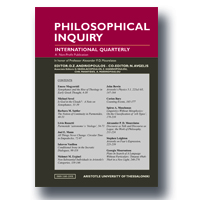|
|
|
1.
|
Philosophical Inquiry:
Volume >
32 >
Issue: 3/4
Pablo García Castillo
Plato:
The ship of state
abstract |
view |
rights & permissions
| cited by
This paper's aim is to study the Greek simile of the ship of state, since it was born in the Lyric Poetry until its definitive drawing by Plato's hands. It describes the image of Paros' ship, by Archilochus, or the ship of city by Alcaeus and by Theognis. Analyzes how this image improves through the tragedies of Aeschylus and Sophocles, and their moral comprehension of it. And, at last, explains the excellence achieved as the central image on Plato's politic project.
|
|
|
|
|
|
|
2.
|
Philosophical Inquiry:
Volume >
32 >
Issue: 3/4
Robert William Mosimann
A Revised Chronology of Plato's Dialogues
view |
rights & permissions
| cited by
|
|
|
|
|
|
|
3.
|
Philosophical Inquiry:
Volume >
32 >
Issue: 3/4
Theodoros Christidis, Demetrius Athanassakis
On Heraclitus' Concept of λόγοϛ
abstract |
view |
rights & permissions
| cited by
Our purpose in this paper is to bring about a new meaning of the term λόγοϛ used in the fragments of Heraclitus' work. In ancient Greek literature this term hasmany different meanings. We are going to restrict our interest in those meanings that Heraclitus used in his fragments, where the term λόγοϛ appears ten times.
|
|
|
|
|
|
|
4.
|
Philosophical Inquiry:
Volume >
32 >
Issue: 3/4
D.Z. Andriopoulos
Notes on the Aristotelian Theory of Memory and Anamnesis
view |
rights & permissions
| cited by
|
|
|
|
|
|
|
5.
|
Philosophical Inquiry:
Volume >
32 >
Issue: 3/4
Gerard Casey
Where Does Law Come From?
abstract |
view |
rights & permissions
| cited by
Law, like language, is the product of social evolution, embodied in custom. The conditions for the emergence of law—embodiment, scarcity, rationality, relatedness and plurality—are outlined, and the context for the emergence of law—dispute resolution—is analysed. Adjudication procedures, rules and enforcementmechanisms, the elements of law, emerge from this context. The characteristics of such a customarily evolved law are its severely limited scope, its negativity, andits horizontality. It is suggested that a legal system (or legal systems) based on the principles of archaic law could answer the needs of social order without permitting the paternalistic interferences with liberty characteristic of contemporary legal systems.
|
|
|
|
|
|
|
6.
|
Philosophical Inquiry:
Volume >
32 >
Issue: 3/4
D.Z. Andriopoulos
Philosophy and Music
view |
rights & permissions
| cited by
|
|
|
|
|
book review |
|
7.
|
Philosophical Inquiry:
Volume >
32 >
Issue: 3/4
Nikolaos Avgelis
Ancient Cypriot Literature, Volume VI
view |
rights & permissions
| cited by
|
|
|
|
|
8.
|
Philosophical Inquiry:
Volume >
32 >
Issue: 3/4
D.Z. Andriopoulos
The Logic of Forms in Orson Welles's Movies
view |
rights & permissions
| cited by
|
|
|
|
|
9.
|
Philosophical Inquiry:
Volume >
32 >
Issue: 3/4
Thomas Teufel
The Cambridge Companion to the "Origin of Species"
view |
rights & permissions
| cited by
|
|
|
|
|
10.
|
Philosophical Inquiry:
Volume >
32 >
Issue: 3/4
Catherine Kemp
Legal Theory, and Judicial Restraint
view |
rights & permissions
| cited by
|
|
|
|
|
11.
|
Philosophical Inquiry:
Volume >
32 >
Issue: 3/4
Anastasia Marinopoulou
Wittgenstein and the Turning Point in the Philosophy of Mathematics
view |
rights & permissions
| cited by
|
|
|
|

